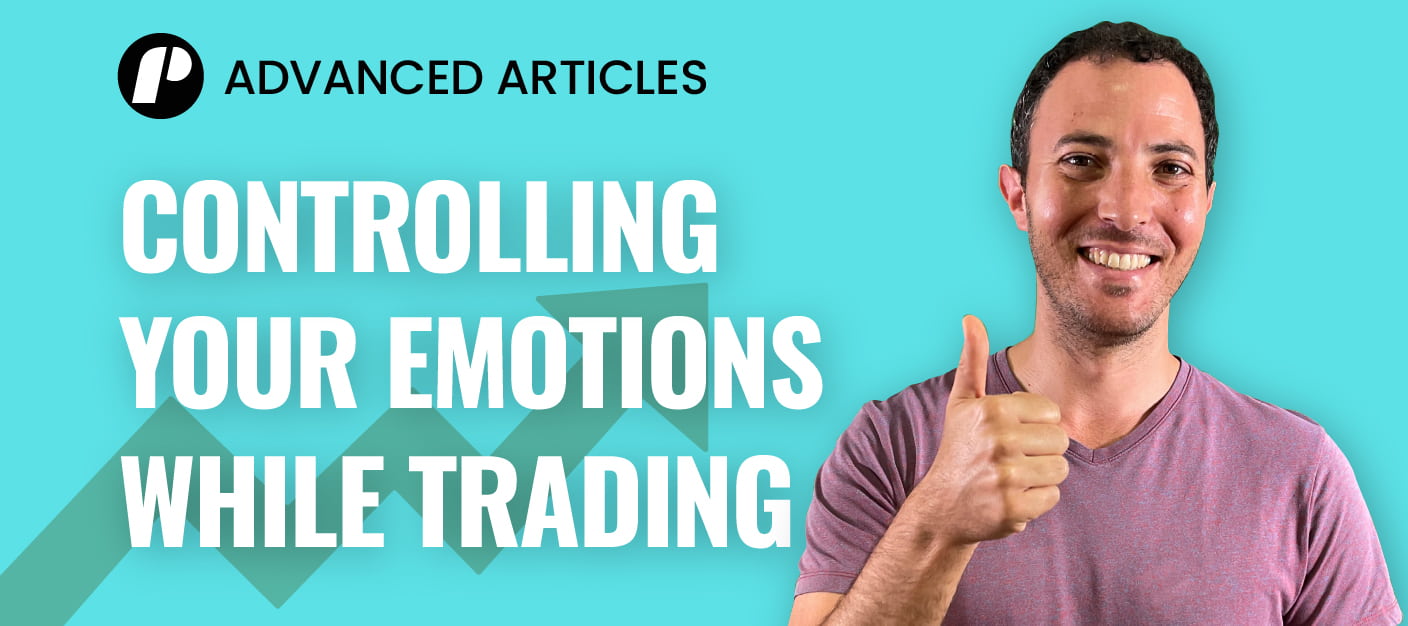
Trading Emotions
If you want to be a great day stock trader, you must learn to control your trading emotions. The difference between your success and failure as a day stock trader depends on your ability to control your emotions. The slightest lapse can ruin your hard-earned accumulated profit overnight if you do not control your feelings.
So, as a trader, you must understand the significant impact your mental state has on your trading endeavors. Firstly, to stay clear and directed throughout the trading day, you must pinpoint the emotions you should be cautious of. You should be able to keep a calm demeanor even on a stormy trading day if you want to be consistent at trading.
Also, understand that trading is a game of probability, and having your emotions on a roller coaster every day is not sustainable. So, as a stock trader, you should also have strategies/ways to control your emotions.
If you don’t have all these things figured out yet, keep reading as we help you understand how to manage your emotions while trading.
Emotions to Be Cautious of While Trading
The first thing you need to learn is those emotions you should be cautious of while trading. Note that not everything you feel is terrible while trading. For example, it makes sense to trust your gut feeling when making trading decisions based on statistics, amongst other things.
With that being said, here are three of the most common emotions traders should be cautious of.
Fear/nervousness
Being scared or nervous about making trades is the last thing you want to feel as a trader. Trading is essentially all about taking calculated risks. So, if you let fear rule your decisions, you may make irrational decisions.
The most common cause of anxiety in trading is trading too big. When you aren’t ready to trade big, do not trade big! Making the wrong size of trades magnifies the volatility, which can earn you a significant profit or a loss you are not ready to bear.
Conviction/excitement
Excitement and conviction are strong emotions you will want to feed off whenever entering any trade. When you have a solid conviction about a particular trade, you should make the trade. Similarly, if you do not have a decent level of conviction or excitement about a trade, then there is a good chance it is not the right trade for you. By right, we mean the trade may not be by your trading plan.
Bad trades can be winners just as good trades can be losers. So making sure you have a conviction on trades will help ensure consistent wins.
Greed/overconfidence
Also, greed is one feeling you do not want to have when you are trading stock.
Whenever you only want to take trades with a possible big win, you should evaluate yourself, as this might be a result of greed. Being ambitious when trading is one thing, but being greedy is a different ball game you want to ensure you avoid. If you aren’t careful, being greedy could cause you to slip and end up in a drawdown.
Greed with a sprinkle of overconfidence is a terrible combination of emotions any trader should feel. To keep yourself in check, always check that you are using proper trading mechanics (i.e., targets, stops, good trade set-ups, good risk/management).
Impact of Trading The Stock Market Emotionally
Now that you know the emotions to avoid and the ones to stick by, you are one step closer to trading like a pro. Overall, trading based on emotion has several pitfalls and can result in significant capital loss.
Here are some of the impacts of trading emotionally:
Exposes you to unnecessary risks
Trading the stock market is quite risky, and several systematic and unsystematic risks are associated. For this reason, traders use trading strategies to mitigate the risks of the stock market.
As a trader, if you trade under emotions, you tend to adopt a myopic approach which exposes you to unnecessary risks. Irrespective of the stock you are trading, it is essential to base your trades on fundamental trading strategies.
When you trade with emotions, you tend to ignore essential fundamental aspects of trading. It exposes you to risks you could avoid if you didn’t forget these critical aspects.
For example, when the market is at an exhilarating bull run, some traders buy stocks without much research due to fear of missing out. Doing this elevates the quantum risk significantly and increases their chances of a capital loss.
Results will not align with your goals
Whether investing or trading, you must align your decisions with your goals. Goal-based trades ensure that your money is available when you need it. But when you trade emotionally, you tend to take calls that do not follow this principle. In other words, it makes you aloof toward the larger picture and makes you have a short-term view. And in the long run, this is detrimental to wealth creation.
But when you trade unemotionally, your decisions will be based on facts, figures, and logic. Therefore, trade unemotionally increases your chance of reaching the goal you wish to achieve. Doing this does not only enhance your wealth but also gives you a pleasant experience while trading. At the same time, keeping your emotions in check will help you as a trader understand the impact of various market forces, navigate the market better, and develop a solid strategy to augment your gain further.
It makes your trading experience unpleasant
Another reason to ensure there is no room for emotions while trading is that it makes your trading experience unpleasant.
You ought to understand that a stock market is an opportune place that creates wealth, provided you will not adopt shortcuts to success and are ready to stay committed. Taking shortcuts often leads to flawed decisions that can mar your entire experience. Things are not different when dealing with emotions.
Irrespective of the emotion, whether greed or fear, there is a good chance that making trading decisions based on these emotions can make your experience sour. The truth is that a bad trading experience during formative trading days can act as a dampener or even turn you off-market forever.
Several traders have turned their backs on the stock market because of a not-so-good experience. But the stock market, particularly equities, has the potential to generate inflation-beating returns.
It makes you indulge in revenge trading
Losing money due to emotional trading can make you go into revenge trading. This trading style means you go ahead with a trade to recover a previous loss. Trading this way is risky because you have an intense feeling to overcome the loss quickly. And in an attempt to achieve this, you make random trades that can cause more harm than good.
The dangers of indulging in revenge trades don’t end there. It can also make you overtrade, which can significantly increase your costs. Also, your stress level will go up, and there are high chances that you will make many bad calls.
However, things can be very different when you trade unemotionally. So, when things are not going your way, it is best to stop trade for that day, find out where you might have gone wrong, and take corrective measures to ensure your success the next time you trade.
Ways to Control Your Trading Emotions
The importance of controlling your emotions while trading cannot be overstated!
No doubt seeing the red stacking up on your losing position can make your emotions take over. It is at this point the fight or flight instinct kicks in. The impulse to recover your losses can drive you to make emotional trades.
Here are 1o things you can do to control your emotions:
Conquer your emotions by defusing your feelings
At the heat of the moment, and when you feel that sudden rush of emotions, you can easily control your emotions by defusing them. How? Simple, rather than acting on whatever feeling or emotions you are having, take a step back and evaluate your decision. It is essential to do this, particularly after a loss or a win, because it is at this point that our emotions take over the most.
Ask yourself if you will still make the same decision if you weren’t feeling down about a loss or excited about a win. To truly conquer your emotions, see them for what they are and not just how they make you feel. Our feelings tend to overcome our analytical minds, and we fall into the full power of our emotions when we make a call that causes a significant loss of profit.
Keep tabs on your feelings
Knowing when you have any particular emotional breakdown will truly help turn it into a productive experience. Writing down your feelings as you are experiencing it can help you keep tabs on them. You can write your feelings in a calendar or a diary. By doing this simple task every day, you can monitor your emotions throughout a trading day. So, you can perhaps know which trade you made based on emotions at the end of every trading day.
While evaluating your emotional history at the end of the day, assess the cause of any specific emotion. Determine if there is an environmental factor involved or purely a result of trades. Remember, your goal for keeping a tab on your feelings is to suppress and avoid them. So as you understand the cause and its effect, you should also take the necessary steps to prevent it.
Distance yourself from your thoughts
Another thing you can do to control your emotions better while trading is to distance yourself from your thoughts! You can get stuck in your head when your thoughts consume you entirely. In this state, it is somewhat tricky to make clear trading calls. We are not saying you ought not to think before making trades, but your feelings have nothing to do with the trade outcome. Instead, it would be best to base your trading decisions on facts and statistics.
When you notice your thoughts are beginning to get your best while trading, it is ideal for distancing yourself from them. Having a clear mind when you enter the trading market will help you make the best trading decisions. But what is essential is to keep your emotions at a distance so you can see farther. Note that distancing yourself from your thoughts and emotions is not as easy as it may seem. It takes a lot of effort, practice, and patience, but the result will be worth it at the end of the day.
Be mindful and aware
If you often find yourself in a position where your emotions often get the most of you while trading, then it’s time you increase your awareness and practice mindfulness. When you are more aware of what you are doing, it keeps your emotions in check. This way, when you start feeling more emotional about perhaps a trade that goes bad or one that went well, you will be more alert to it.
Practicing mindfulness takes much work as you are essentially training your brain to alert you when you have specific thoughts. To achieve this, you need to be deliberate about your activities at the end of every trade. For example, when a trade ends and your loss, be intentional about sticking to a trading plan. When you consistently follow through with it over some time, your brain develops a reasonable response such that whenever you are about to deviate from this normal, it alerts you.
Wait your thoughts out
In addition to being mindful about your decision, another trick many traders have used from time immemorial to keep their emotions under check is waiting them out. After every trade, how you feel is only temporary! Whether you are feeling down or you are feeling happy about the trade, it is that you do not act on them. Instead, visualize whatever you think and give it a tag.
If you are angry about a call you made about a trade, visualize it and label it as anger. Visualize it for about 15 minutes or more, depending on what you feel is right. It might seem like a waste of time at first, but know that you are slowly training yourself to hold your thoughts and feelings rather than acting on them immediately you feel them. As time goes by, whatever emotion you may have had will subside, and you can see it for what it is.
Create a new narrative for your feelings
Another trick you can use to control your emotions is creating a new narrative. This strategy is helpful in trading and every work of life. Creating a new description of how you feel means changing how you think about a feeling. For example, if you are feeling angry about a wrong trading call, rather than saying “I am angry,” you can say, “I am experiencing the sensation of anger.”
Why change the narrative of your feelings, you may wonder? Well, by doing so, it puts a reasonable distance between you and your feelings. It also allows you to act more rationally and see what you feel clearly. This new perspective in which you give your feelings can also help you gain new psychological insights. So, if your emotions make you feel down and unwilling to continue trading, create a new narrative for your feelings; it might just be the solution to all your problems.
Don’t confuse prudence with fear
Many beginner traders often make one mistake: they confuse being prudent with fear. Fear is an emotion that you should be cautious of while trading, but prudence is a thought process you should not throw out the window. When you are being prudent about a particular trade, you are basing your trading decisions on logic and reason. So you must be cautious in every trade you make and not fear. Fear can wreck your trading by keeping you from making a trade.
Although when you are prudent about a trade, it perhaps requires you to reevaluate the statistics sometimes. This hesitation may save you from losing a lot of money at the end of the day. At the same time, hesitating to make a trade can also cost you the potential to make much money. However, what truly matters at the end of the day is to ensure you try to limit your loss to the barest minimum.
Take a walk at the end of each trade
At the end of each trade, it is important to distract your mind. After analyzing your trading decision throughout the day, take a walk. Walking is mainly known to refresh the mind and help one think clearly. Even before the trading day is over, you can still decide to take a walk when you realize things are not going as smoothly as you’d want it. Rather than sit in front of your screen feeling frustrated and letting your emotions get the better of you, take a walk to refresh your mind.
Walking puts a deliberate break in your trading tempo. A simple 10 to 15 minutes walk in and around the block can help you put things in perspective. Perhaps there might be one little detail you have been leaving out of consideration that is why things are going sour. But when you take a walk, you come back in with a fresh mind on coming back. So, do not let the market drag you into trades; instead, walk away from the market any time you want.
Don’t focus too much on profit or loss while trading
If you can, while you are trading, cease being too focused on your profit or loss. Doing this can be challenging; this is why you ought to have a trading plan. In your plan, you should have a target profit you want to hit that day and a maximum loss you can afford to incur that trading day before you call it a day. So, provided you have not been signaled to have crossed any limit, it means things are looking good, and you can continue trading.
When you focus too much on your profit or loss, it will influence your trading decision. Imagine sustaining three consecutive losses. It is customary to want to shift to revenge trading, where you regain everything you’ve lost. But by doing so, you may end up losing more funds. Similarly, when making trading calls that earn you profit, you are more likely to fear taking risks to avoid losing your accumulated gains.
Establish a trading plan
Last but not least, you should establish a trading plan. By having a well outlined and easy-to-follow trading plan, you can keep yourself from derailing into making decisions based on your emotions. Although after establishing a trading plan, you still have to stick to it. Having a trading plan and not sticking to it is the same as not having it.
Virtually every trader in the market depends on some guideline or plan for their success. After all, when it comes to trades, you must liquidate them to realize a profit. If you do not have a trading plan, you must take the time to develop one now. You can think of having a trading plan as an adventurer with a map. The program will help you get to an expected goal.
Trading Emotions Conclusion
While trading, controlling your emotions is not about destroying or changing your feelings and thoughts! You will never be free of intrusive emotions and wandering thoughts if you do so. Instead, you ought to recognize these emotions and deal with them accordingly. This is the central premise of this article. While it takes time to put your emotions and feelings under control, they are worth every bit of effort you put into controlling it.
If you liked this post make sure to share it!





